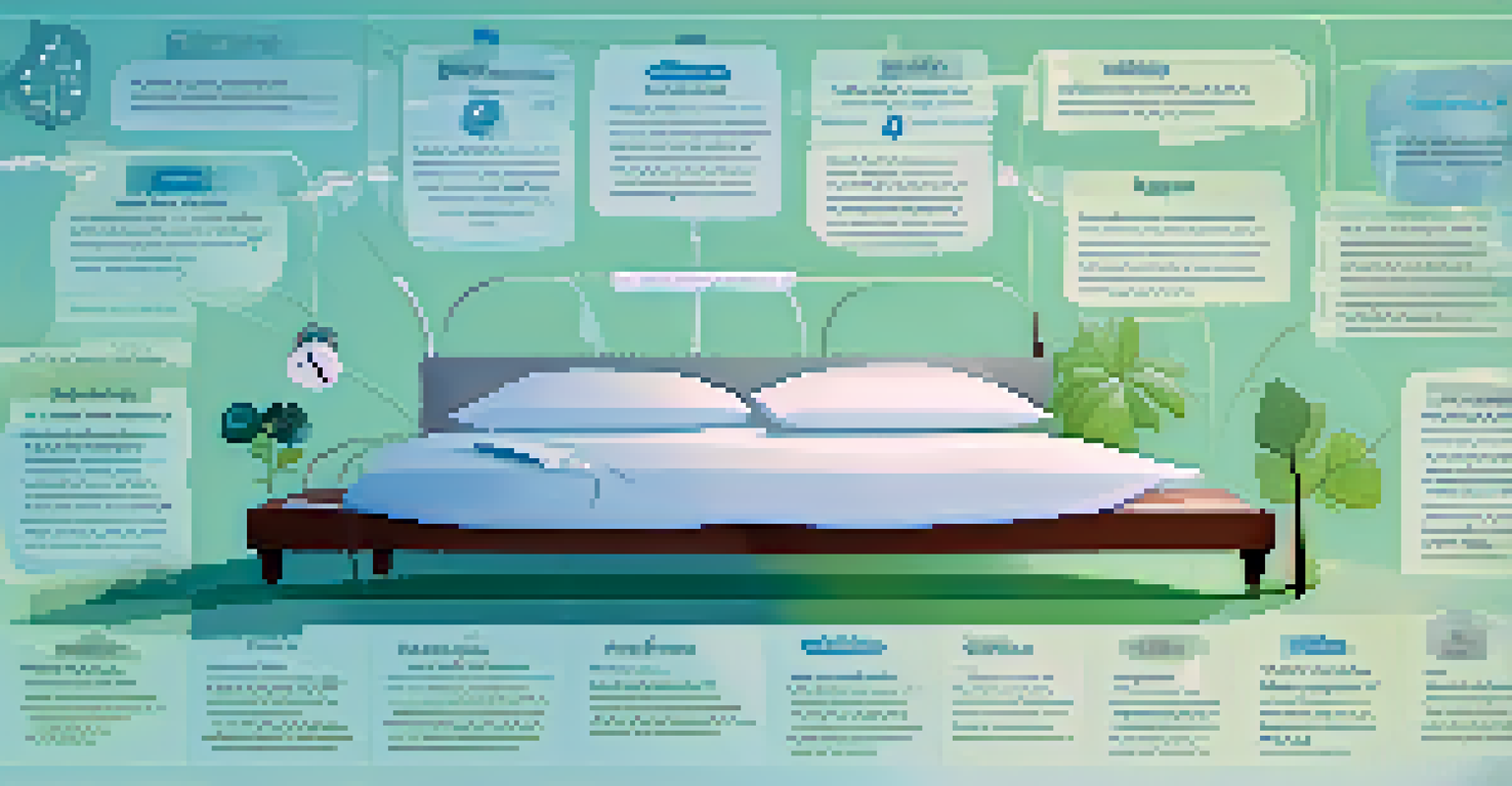Sleep Disorders: Myths vs. Facts You Should Know

Understanding Sleep Disorders: An Overview
Sleep disorders encompass a range of conditions that affect our ability to sleep well. These disorders can lead to excessive daytime sleepiness, fatigue, and even serious health issues. Common types include insomnia, sleep apnea, and restless leg syndrome. Understanding these disorders is crucial for recognizing their impact on daily life.
Sleep is the best meditation.
Many people underestimate the prevalence of sleep disorders, thinking they are rare. In reality, millions suffer from them, often without even realizing it. This lack of awareness can contribute to worsening symptoms and prolonged suffering. By acknowledging the widespread nature of these issues, we can start addressing them more effectively.
Additionally, sleep disorders are not just about poor sleep quality; they also intertwine with mental health. Conditions like anxiety and depression can exacerbate sleep problems, creating a vicious cycle. Recognizing this connection is essential for holistic treatment approaches.
Myth 1: Sleep Disorders Are Just About Not Sleeping Enough
A common misconception is that sleep disorders only occur when someone isn’t getting enough sleep. However, it's much more complex than that. Sleep disorders can also involve problems like interrupted sleep, difficulty falling asleep, or even excessive sleepiness during the day. This means someone can get a full eight hours yet still struggle with a sleep disorder.

For instance, individuals with sleep apnea may snore loudly and stop breathing momentarily during sleep, leading to poor sleep quality despite spending enough time in bed. This condition can leave them feeling exhausted the next day, highlighting that quantity of sleep does not always equate to quality.
Sleep Disorders Affect Everyone
Many individuals of all ages suffer from sleep disorders, often without realizing it, highlighting the need for awareness and early intervention.
Understanding that sleep disorders can manifest in various ways helps demystify the issue. It encourages those affected to seek help, even if they think they’re getting enough sleep. Recognizing the signs is the first step toward better sleep health.
Myth 2: Only Older Adults Suffer from Sleep Disorders
Another prevalent myth is that sleep disorders are an issue solely for older adults. While it's true that age can impact sleep, individuals of all ages can experience sleep problems. In fact, younger people, especially teenagers and young adults, face unique challenges like stress and technology use that can disrupt their sleep patterns.
A good laugh and a long sleep are the best cures in the doctor’s book.
For example, many students struggle with insomnia due to academic pressures and late-night screen time. This group may not be as aware of their sleep issues because they often prioritize social activities and studies over rest. The result? A significant portion of young adults may be suffering silently.
Breaking the stereotype that sleep disorders only affect older individuals opens up conversations about sleep health across all age groups. It emphasizes the importance of addressing sleep issues early to prevent them from escalating into chronic problems.
Myth 3: You Can 'Catch Up' on Sleep
Many believe that if they miss out on sleep during the week, they can simply 'catch up' over the weekend. Unfortunately, this isn’t how our bodies work. While sleeping in can provide temporary relief, it doesn’t fully compensate for the effects of sleep deprivation accumulated during the week.
Research shows that chronic sleep deprivation can lead to cognitive impairments and emotional instability, which can’t be remedied by just sleeping longer on days off. It’s like trying to fill a bucket with holes; no matter how much water you pour in, it will never be full. The time lost to poor sleep can have long-lasting consequences on overall health.
Quality of Sleep Matters Most
It's not just about the number of hours slept; conditions like sleep apnea can lead to poor sleep quality, leaving individuals feeling exhausted.
Instead of relying on catch-up sleep, it’s crucial to establish a consistent sleep schedule. Prioritizing sleep as part of a daily routine helps maintain a healthy balance and promotes better overall well-being.
Myth 4: Sleep Disorders Are Not a Serious Issue
Some people mistakenly believe that sleep disorders are just minor inconveniences and not a serious health concern. In reality, untreated sleep disorders can have significant impacts on both physical and mental health. Conditions like sleep apnea can lead to severe complications such as heart disease, diabetes, and high blood pressure.
Moreover, sleep deprivation can affect cognitive function, leading to memory problems, decreased productivity, and impaired judgment. This is particularly concerning in situations like driving or operating machinery, where lack of sleep can pose serious risks.
Recognizing the serious nature of sleep disorders is vital for encouraging individuals to seek help. Understanding the potential consequences not only raises awareness but also empowers people to prioritize their sleep health.
Myth 5: Sleep Aids Are the Best Solution
While sleep aids can be beneficial for some, relying solely on them is a misconception. Many believe that popping a pill is the easiest fix for sleep issues, but this approach often overlooks the root cause of the problem. Sleep aids may help temporarily, but they don’t address underlying issues like anxiety, poor sleep hygiene, or lifestyle factors.
For instance, someone may find themselves dependent on sleep medication without realizing that simple changes like creating a calming bedtime routine or reducing screen time could significantly improve their sleep quality. It’s essential to view sleep aids as a part of a broader strategy rather than the sole solution.
Napping Can Be Beneficial
Short naps can enhance alertness and mood, proving that they can be a helpful addition to a healthy sleep routine when done correctly.
A holistic approach that includes lifestyle changes, cognitive behavioral therapy, and good sleep hygiene practices often yields better long-term results. Empowering individuals with knowledge about various treatment options can lead to more effective management of sleep disorders.
Myth 6: Everyone Needs the Same Amount of Sleep
A common myth is that everyone requires exactly eight hours of sleep to function optimally. However, sleep needs can vary significantly from person to person. Factors such as age, genetics, lifestyle, and overall health all play a role in determining how much sleep an individual needs to feel rested.
For example, some people may feel fully rested after just six hours, while others may need up to ten hours for the same effect. It’s essential to listen to your body and understand your unique sleep needs rather than adhere to a one-size-fits-all guideline. This personalized approach can lead to better sleep and improved daily performance.

Recognizing that sleep needs are not uniform encourages individuals to prioritize their own well-being. It promotes a culture of self-awareness, allowing people to make informed decisions about their sleep habits.
Myth 7: Napping Is Bad for Your Sleep
Many people believe that napping is detrimental to nighttime sleep, but this isn’t entirely true. Short naps can actually be beneficial, enhancing alertness and improving mood. In fact, a quick 20-minute nap can boost cognitive function and productivity without interfering with nighttime rest.
However, it’s essential to approach napping wisely. Long or late-afternoon naps can disrupt the natural sleep-wake cycle, making it harder to fall asleep at night. The key is to keep naps short and ideally schedule them earlier in the day to reap the benefits without negative consequences.
Understanding the role of napping in a healthy sleep routine can empower individuals to use this tool effectively. By incorporating short naps, people can enhance their overall sleep quality and daily performance.